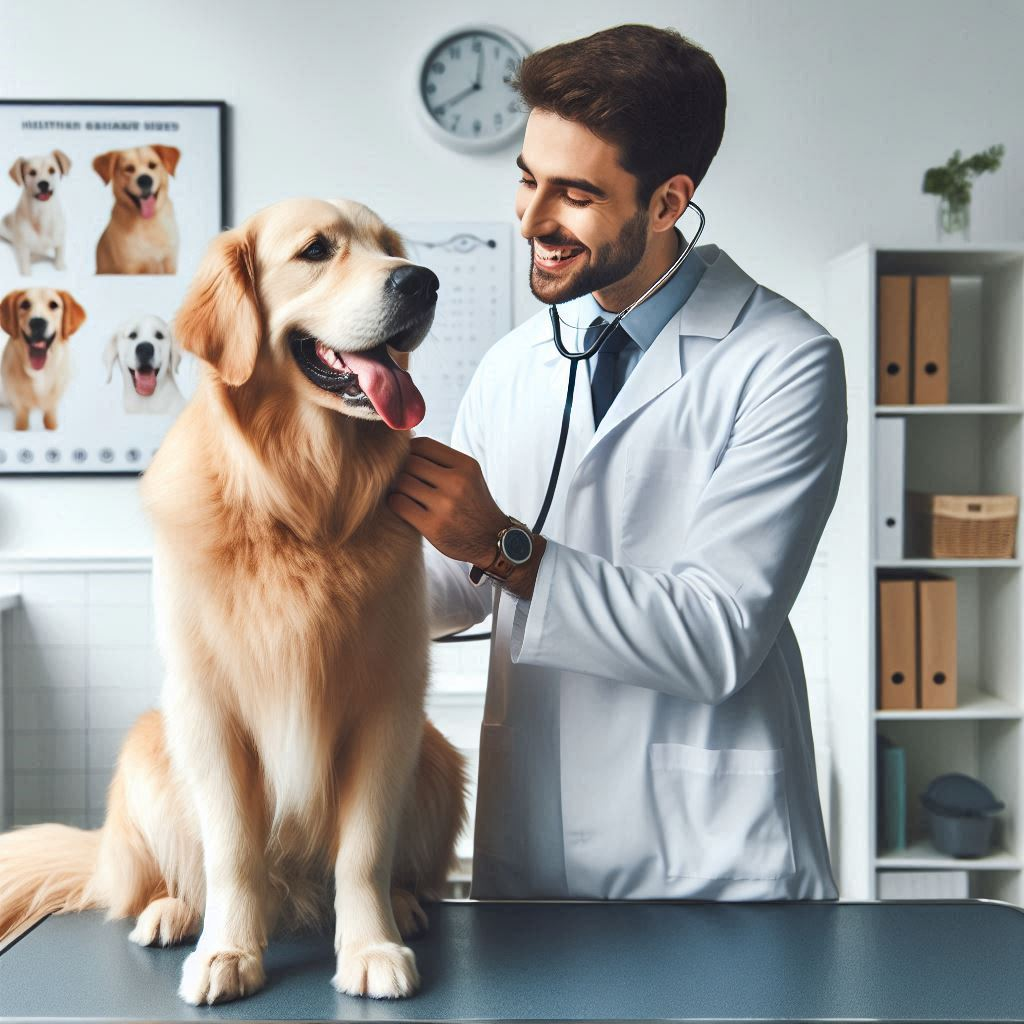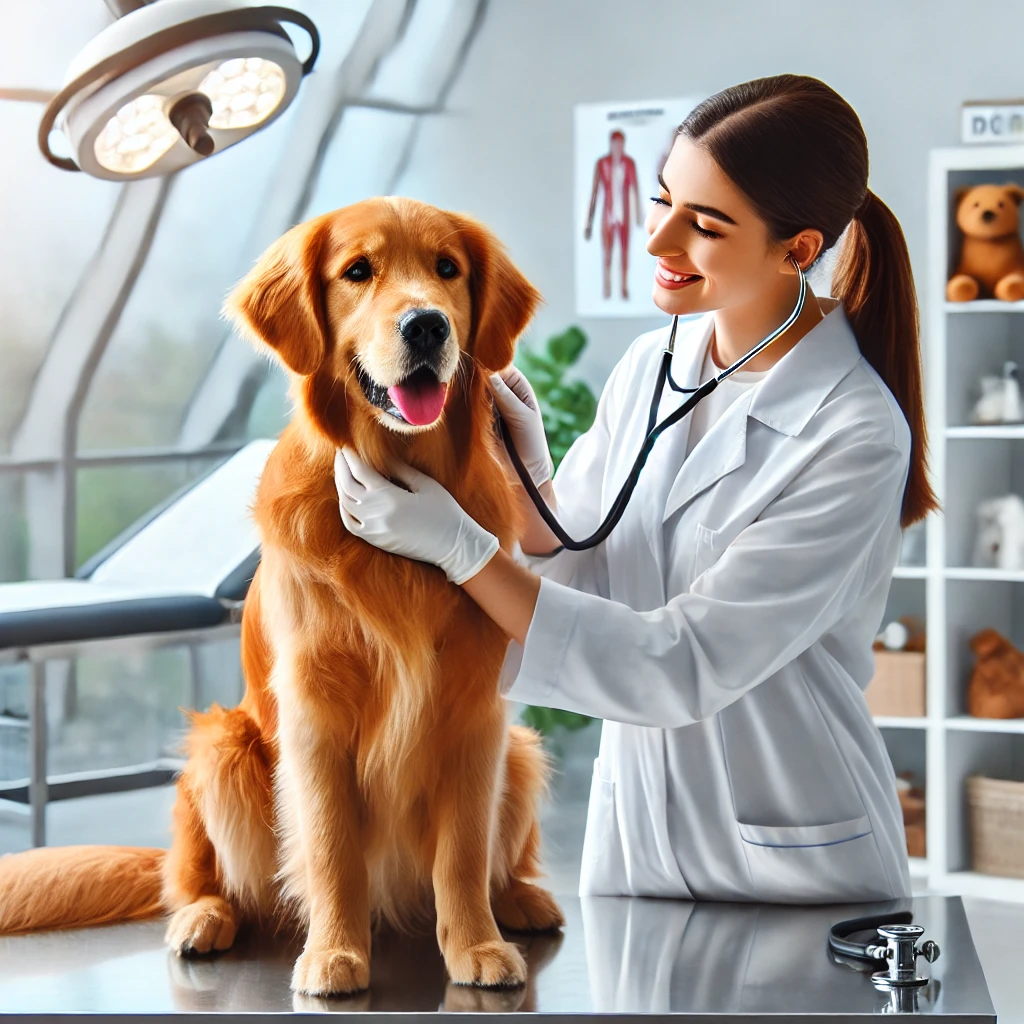Your health care for a dog and longevity must make sure they receive frequent medical attention. Dogs need regular care for their physical and mental well-being, just like people do, to live long, healthy, and happy lives.
Let’s explore the basic components of normal routine health care for a dog, from veterinary checkups to grooming.

What is a Routine Health Care for a Dog?
Regular Veterinary Checkups – The Cornerstone of Dog Health
The foundation of health care for a dog is routine veterinary checks that help in the early detection of possible problems.
During these appointments, your dog’s veterinarian may keep an eye on their general health, follow their development, and treat any health issues as soon as they appear.
Dogs should see a veterinarian at least once a year, while older and puppy dogs may require more frequent checkups.
- To evaluate health care for a dog, the veterinarian will check them physically, monitor their vital signs, and sometimes suggest blood work or other diagnostic procedures.
- Discussing any changes in behavior, food, or level of activity that may point to underlying health issues is another benefit of routine checkups.
Vaccinations – Protecting Your Dog from Common Diseases
Vaccinations are essential for protecting your dog from a wide range of dangerous and infectious illnesses.
Regardless of lifestyle, core vaccinations like those against rabies, distemper, parvovirus, and adenovirus are necessary for all dogs.
Certain non-core vaccines, like those against Lyme disease or canine influenza, might be suggested in light of your dog’s risk factors.
- Early vaccinations are recommended for puppies, with booster doses given per your veterinarian’s recommendations.
- In addition to protecting your dog, having up-to-date vaccinations also helps stop diseases from spreading to people and other animals.
Dental Care – Maintaining Your Dog’s Oral Health
Always focus the routine dental health care for a dog just like people do in order to avoid problems like gum disease, tooth decay, and bad breath.
Ignoring dental health issues in your dog can result in painful infections, tooth loss, and even more dangerous illnesses like heart disease.
- Using toothpaste made especially for dogs and brushing their teeth many times a week is a good approach to keeping their oral health in check.
- To further prevent plaque development and maintain the health of your dog’s mouth, provide them with dental chews and schedule routine professional cleanings at the veterinarian.
Parasite Prevention – Shielding Your Dog from Fleas, Ticks, and Worms
A key element of regular medical care is parasite prevention, which shields your dog from dangerous parasites like heartworms, fleas, and ticks.
These parasites can lead to a variety of health problems, from serious illnesses to skin irritation.
- In general, a monthly schedule of oral medication, topical treatments, collars, or other parasite preventatives is advised.
- Your dog’s age, weight, and lifestyle can all be taken into consideration when your veterinarian recommends products.
- A further essential step in preventing infestations is routinely inspecting your dog for indications of parasites, particularly after outdoor activity.
Read: What does it mean when your dog is biting you?
Nutrition – Feeding Your Dog a Balanced Diet
A healthy diet is essential health care for a dog since it gives them the energy and minerals they require to flourish.
Good fats, a range of vitamins and minerals, and high-quality protein should all be included in a balanced diet.
A healthy diet can boost your dog’s immune system, help them stay at their right weight, and increase their general energy.
- Selecting dog food that is suitable for your dog’s size, age, and activity level is necessary.
- The nutritional requirements of puppies, adult dogs, and senior dogs vary, thus feeding your dog based on their life stage will guarantee they get the right nutrients.
- Additionally, discuss any dietary requirements or unique needs your dog might have with your veterinarian.
Exercise and Mental Stimulation – Keeping Your Dog Active and Happy
Maintaining health care for a dog and mental health requires regular exercise and mental engagement.
All kinds and sizes of dogs require regular exercise to maintain their fitness, avoid obesity, and burn off extra energy.
Walks, runs, playing, and exercises like agility training or retrieving can all count as forms of exercise.
- Providing your dog with mental stimulation is as necessary as keeping them happy and active.
- Puzzle toys, training sessions, and interactive play can challenge your dog’s thinking and prevent boredom, which can lead to aggressive tendencies.
- You can guarantee that your dog is properly stimulated and content by customizing mental and physical exercises to their breed and energy level.

Grooming – Regular Maintenance for a Healthy Coat and Skin
Regular grooming helps your dog maintain a glossy coat and healthy skin in addition to keeping them looking their best.
Grooming requirements for dogs can range from basic brushing to more involved care that includes frequent trims, baths, and nail cutting, depending on the breed.
- In addition to removing loose hair, dirt, and debris from your dog’s coat, brushing helps avoid matting, which can cause discomfort and skin problems.
- Depending on your dog’s coat type and amount of activity, bathing should be done as needed.
- Regular nail cutting is also necessary to avoid overgrowth, which can hurt or make walking difficult.
Senior Dog Care – Adapting Routine Care for Older Dogs
Health care for a dog demands alter as they get older, requiring modifications to their regular care to guarantee their comfort and well-being.
To keep an eye on chronic conditions like arthritis, kidney illness, or cognitive loss, senior dogs may need more regular trips to the veterinarian.
- Dietary modifications could also be required to treat specific health issues or changes in metabolism.
- While they still have value, gentle exercise, consistent brushing, and mental stimulation may need to be modified to account for your dog’s lowered energy and slower speed.
- Keeping your elderly dog in a relaxed, comfortable environment is essential to preserving their quality of life.
Bottom Line
You may contribute to your dog’s long, healthy, and happy life by creating a regular, routine health care for a dog plan.
A solid health routine that includes frequent tests, vaccines, a balanced diet, and continuing care will keep your dog healthy and happy throughout their entire life.
Keep in mind that a happy dog is a healthy dog, and the time and effort you put into their upkeep will pay off in years of happiness and companionship.
